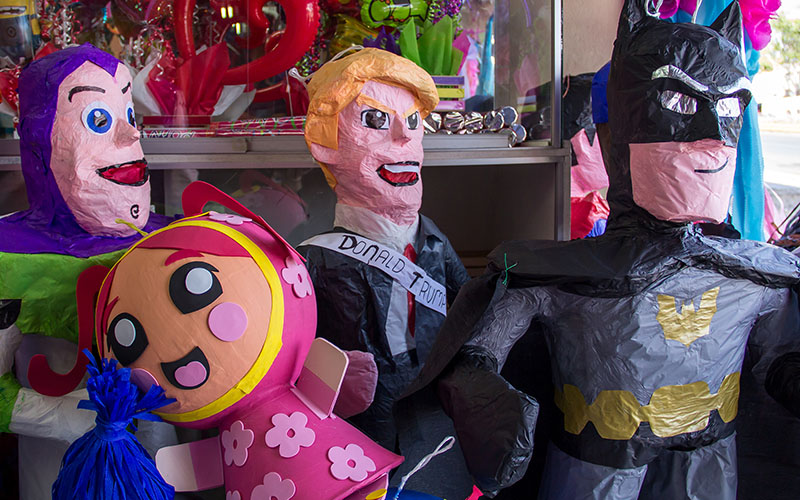
A Donald Trump piñata keeps curious company in Globo Kimba, Javier Velazquez’s piñata shop. (Photo by Adrienne St. Clair/Cronkite Borderlands Initiative)
So many of my conversations in Mexico felt like a movement toward my own personal understanding. Not only do I feel like I know more about the events between the U.S. and Mexico between 1810 and 2010, but I understand a little more about the feelings of some of the Mexicans living in the heart of their country.
I traveled to Mexico and finished this report before the Trump administration’s announcement to “wind down” DACA and before the big earthquake in Mexico City, but those events make the feelings and thoughts of the Mexican people even more relevant.

The sun sets over Santiago de Querétaro, the capital and largest city in the state of Querétaro in Mexico. (Photo by Adrienne St. Clair/Cronkite Borderlands Initiative)

A street vendor moves merchandise along a sidewalk near the city center of Santiago de Querétaro in Mexico. (Photo by Adrienne St. Clair/Cronkite Borderlands Initiative)

Tourists and locals visit shops and restaurants nestled in old Spanish-style buildings, which are one of the unique characteristics of downtown Santiago de Querétaro in Mexico. (Photo by Adrienne St. Clair/Cronkite Borderlands Initiative)

A 74-arch aqueduct is one of Querétaro’s distinguishing features and has a romantic history. It was built partially because a marquis fell in love with a nun. (Photo by Adrienne St. Clair/Cronkite Borderlands Initiative)

Increased economic growth in central Mexico has brought about an emerging middle class and the appearance of gated communities like this one, which is located just outside of Santiago de Querétaro. (Photo by Adrienne St. Clair/Cronkite Borderlands Initiative)

A local woman passes by Karla Agullon’s taco stand called “Tacos el knockout” (“The Knockout”), which is located in Mercado General Escobedo, the oldest market in Santiago de Querétaro. (Photo by Adrienne St. Clair/Cronkite Borderlands Initiative)

A Donald Trump piñata keeps curious company in Globo Kimba, Javier Velazquez’s piñata shop. (Photo by Adrienne St. Clair/Cronkite Borderlands Initiative)

Guadalupe Alvarez sits in the courtyard of her home in San Miguel de Allende, a popular tourist town in the heart of Mexico where she was born and raised. She now works there as a high-end wedding planner. She’s worried about Mexico’s relationship with America because she has many American friends and clients. (Photo by Adrienne St. Clair/Cronkite Borderlands Initiative)

One of Guadalupe Alvarez’s several dogs keeps watch over the courtyard of her home in San Miguel de Allende, in the state of Guanajuato in Mexico. (Photo by Adrienne St. Clair/Cronkite Borderlands Initiative)

Britto Galan is the chef and owner of Tikua Sureste, a restaurant near the center of Santiago de Querétaro. He plans to open a restaurant in New York City in 2018, and he wonders about what he may have to overcome to make that happen. (Photo by Adrienne St. Clair/Cronkite Borderlands Initiative)

Javier Velazquez stands in his piñata shop in Querétaro, Mexico, where he makes piñatas of different well-known characters, including My Little Pony, Woody from "Toy Story" and Donald Trump. He’s never been to the United States, but he kept up with the 2016 American election. (Photo by Adrienne St. Clair/Cronkite Borderlands Initiative)

Industrial parks throughout Guanajuato and Querétaro are designed to help foreign investors start doing business in Mexico. Marco Pardo and his team at this new industrial park in a small town in Guanajuato hope to do business with countries from all over. (Photo by Adrienne St. Clair/Cronkite Borderlands Initiative

Marco Pardo recently started at El Grande, a new industrial park in El Paseo Grande, a small town in Guanajuato. He’s interested in Mexico’s development and progress, and hopes that Mexico will strengthen relationships with countries outside of the United States. (Photo by Adrienne St. Clair/Cronkite Borderlands Initiative)

Karla Agullon sits at a table near the taco stand that she runs with her husband. She does not like Donald Trump’s policies because she has family in the U.S. and she had a bad experience crossing the border years ago. (Photo by Adrienne St. Clair/Cronkite Borderlands Initiative)

Xavier Solana Rivas sits outside Hotel Real Alameda in Santiago de Querétaro, where he’s staying for the 50-year reunion of his agricultural professional program. He’s been a cattle farmer for 35 years in Aguascalientes, about three hours from Querétaro. He is a passionate opponent of President Trump. (Photo by Adrienne St. Ciair/Cronkite Borderlands Initiative)
This podcast is part of the project “Querétaro: Promise of prosperity for Mexico.” Student reporters spent two semesters studying the issues involved and spent eight days on the ground reporting from Mexico, led by Cronkite School faculty members. The full project can be found here. The project was made possible by a grant from the Howard G. Buffett Foundation, the Illinois-based nonprofit organization founded by the international photojournalist, author and philanthropist. Information on the Cronkite News-Borderlands Initiative can be found here.
Special thanks to Roddy Nikpour, who composed “Yes, We’re in a Coffee Shop,” “Eyes are Beautiful” and “Sun Shrine,” the music tracks featured in this podcast were composed by Roddy Nikpour. The tracks can be found here.














